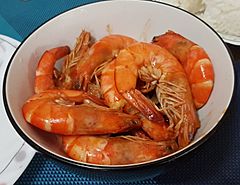Halabos facts for kids

Halabós na hipon
|
|
| Alternative names | Hinalabós, Hinalbós, Inalbós |
|---|---|
| Course | Main dish |
| Place of origin | Philippines |
| Serving temperature | Hot |
Halabós is a super simple and tasty way to cook seafood in the Philippines. It's mostly about cooking fresh shrimp, crab, or other crustaceans (like lobsters!) in water and salt. Today, some people add spices or even use fizzy lemon drinks instead of water. This makes the sauce a bit sweeter and more exciting!
Contents
Where Does the Name Come From?
The word Halabós comes from the Tagalog language. It's a verb that means "to scald in saltwater." You might also see it spelled as halbus, hablos, or halbos.
How Do You Make Halabós?
Making Halabós is one of the easiest ways to cook seafood in the Philippines.
- First, you take whole, unshelled shrimp, crab, or other crustaceans.
- Then, you boil them in water with a little bit of salt.
- You only need to cook them for about one to three minutes. They're ready when they turn a pretty reddish-pink color.
- Traditionally, nothing else is added. The seafood cooks in its own natural juices.
Modern Twists
Today, many people like to add new flavors to their Halabós.
- Instead of plain water, they might use fizzy lemon drinks like Sprite. This gives the dish a sweeter taste.
- Some cooks also add spices like chili peppers or garlic for extra flavor.
- A little bit of butter can also be added to make it richer.
Different Kinds of Halabós
When you see a dish called Halabós, it usually starts with "halabós na". This means it's cooked in the Halabós style. Here are some popular examples:
- Halabós na hipon or halabos na sugpo: These are dishes made with shrimp or prawns.
- Halabós na alimango: This uses a type of mud crab.
- Halabós na alimasag: This dish features the blue swimmer crab.
- Halabós na ulang: This can be made with lobster or large giant river prawns.
- In Zamboanga, there's a special dish called halabos na curacha. It's made from a unique type of crab called the spanner crab (Ranina ranina).
 | Anna J. Cooper |
 | Mary McLeod Bethune |
 | Lillie Mae Bradford |

